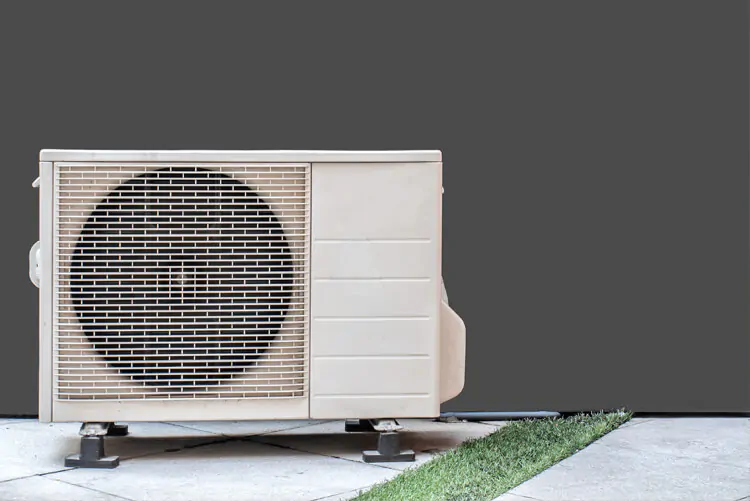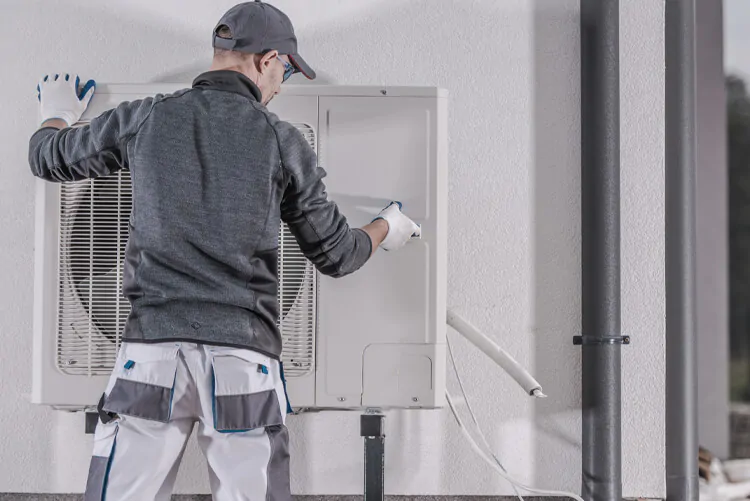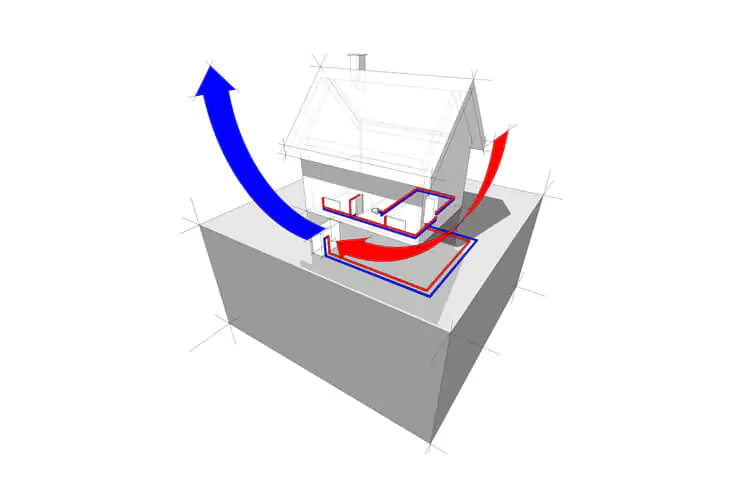What is a heat pump?
A heat pump absorbs energy from outside sources such as the air or the earth and transfers the thermal energy into your home to be used for heating. Part of the HVAC (heating, ventilation, and air conditioning) family, heat pumps are installed on the outside of your property and can reduce your energy bills as well as lower your carbon footprint.
A heat pump typically runs off electricity which powers components such as a compressor, pumps, and a fan that allows the transmission from outside heat to a heating system internally.
What type of heat pumps are available?

How can installing a heat pump save you money?
Due to their lower running costs than traditional heating systems, heat pumps can provide you a significant savings. Of course, there are numerous factors to consider when looking into how much a heat pump could save you in the long run. For example, a well-insulated home will reduce the amount of electricity needing to be used to heat your home.
Heat pumps only use a small amount of electricity, and can often achieve a 200-600% efficiency rate. This is achieved because the amount of energy generated is far higher than the energy used to produce it.
Are heat pumps efficient?
Heat pumps are more efficient than other heating systems due to the ability to produce more heat than the amount of electricity consumed.

Coefficient of Performance (CoP)
We can measure the efficiency of a heat pump by using the term Coefficient of Performance (CoP). This is based on calculating the amount of heat produced for every unit of electricity used to generate the heat.
For example, if a heat pump has a CoP of 4.0, it will produce 4 units of heat for every unit of electricity consumed.
It is worth noting that the CoP is a measurement taken at a single point of time under specific test conditions. This means the CoP measurement may not give an accurate reflection on what it costs to run your heat pump as the temperatures and conditions your heat pump is subject to change throughout the seasons. This is where the Seasonal Coefficient of Performance takes over.

Seasonal Coefficient of Performance (SCoP)
The seasonal Coefficient of Performance (SCoP) or Seasonal Performance Factor (SPF) is used to demonstrate your heat pump’s efficiency throughout the year.
The Energy Saving Trust states that heat pump installers must calculate the SPF based on their design system for your home. The SPF shows how the heat pump should perform due to the average temperature and heating systems in place.
The SPF, although not completely accurate, may be a better way to estimate what you can expect to pay in terms of the running costs of your heat pump.
Heat pump maintenance
Looking after your heat pump is vital to ensure its longevity. The lifespan of a heat pump is approximately 15 years. However, if the heat pump is maintained correctly, its lifespan can reach up to 50 years.
To maintain a heat pump, there are checks that can take place by yourself on a yearly basis to ensure everything is running correctly. It is also required that a professional installer looks over the system around every 3 years. By doing so, you can save yourself money by not letting any small running errors turn into larger problems.

Heat pump funding
There is currently a government-backed funding incentive called the Domestic Renewable Heat Incentive (Domestic RHI) which is being used to help promote the use of renewable heating sources.
People who join the RHI must stick to its rules and by doing so receive quarterly payments for seven years for the amount of renewable heat its estimated their heat pump produces.
You can use the RHI calculator on the Government website here.
Reducing your carbon footprint
By having a heat pump installed, you are helping tackle climate change as most heating in the UK uses fossil fuels such as gas. With Government’s desire to reduce our carbon emissions it is essential that we reduce the number of emissions we generate from our homes.
14% of the UK’s carbon emissions come via our homes. Whether it be hot water or heating. By installing a heat pump in your home, we can help reduce the amount of fossil fuels generated and in turn reduce our carbon footprint.
Frequently asked questions about heat pumps
As the popularity of heat pumps over recent years has increased, there have been many questions regarding how they can not only reduce your carbon footprint, but save you money. Here are a couple of commonly asked questions.
How does a heat pump work?
A heat pump is a device that transfers heat from one location to another and is an incredibly efficient heating method. They work by absorbing energy out of the air of the ground and transferring that heat to heat your home.
Can heat pumps work in cold weather?
Yes! Heat pumps are able to generate heat in temperatures as low as -15C
Where are heat pumps installed?
Heat pumps are generally installed outside of your home where they have access to the outside environment.
Can I save on my heating bills?
Heat pumps can reduce your heating bills due to their heightened efficiency over traditional heating systems such as gas boilers.
How much are heat pumps to install?
There are two main types of heat pumps in the UK. Ground source heat pumps (GSHP) and Air source heat pumps (ASHP). More often than not, ASHP cost varies and range between £8,000-£18,000 while GSHP ae much higher and range between £20,000-£35,000.
You can read more about each here:
